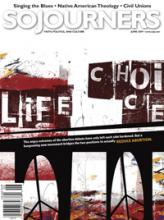As I sit at my desk thinking up innovative ideas for the coming decade—MacArthur Mediocrity Grants, AIG offices relocating to Guantanamo, AIDS awareness seminars for the pope (“I don’t use condoms, so why should Africa?”)—my mind wanders and I think back to the sound the newspaper didn’t make this morning as it was tossed into our yard. What used to wake us with the thud of a small futon falling off the back of a truck now whistles through the air like an empty Slurpee cup, landing noiselessly. The Washington Post, one of the most influential newspapers in the nation, barely makes an impression on our grass, lying there like a discarded half-smoke somebody backed over in a parking lot. The difference is that half-smokes haven’t cut their staff, trimmed their pages, or reduced their award-winning business and books sections to less space than the daily advice columns. (“My sister’s boyfriend wants to attend my upcoming wedding but, given that he’s also my first ex-husband, I don’t feel comfortable with that. Am I being selfish? And how do you feel about purple cummerbunds?”)
I understand that newspapers have to downsize these days, given that the only remaining advertisers are:
• Cell phone companies promoting technology for families to stay connected, even though teenagers would gladly pay extra not to.
• Banks touting their strong balance sheets and continued commitment to fiduciary responsibility, shortly before they are taken over by the federal government.
• Oil companies promoting their decades-long commitment to the environment, and wondering why we haven’t noticed.
Read the Full Article
